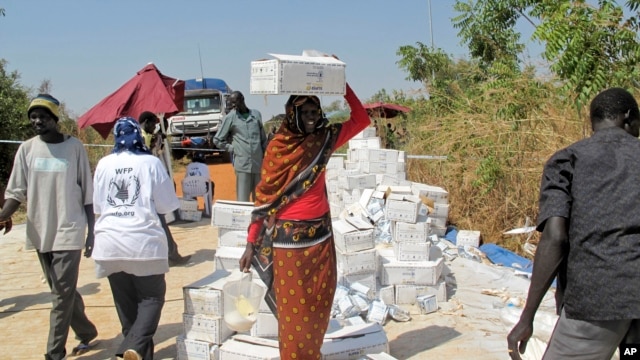| 03-11-2014, 02:01 AM |
Voice of America
 Voice of America Voice of America
Registered: 01-13-2014
Total Posts: 88
|
|
 South Sudan Conflict Erases Gains in Food Security, UN Agencies Say South Sudan Conflict Erases Gains in Food Security, UN Agencies Say
|
 A displaced woman walks with a box of food on her head from a food distribution center at a U.N. compound in Juba, Dec. 23, 2013. (WFP) TEXT SIZEandnbsp; Charlton Doki Last updated on: March 10, 2014 8:46 PM JUBAandnbsp;вҖ” The conflict in South Sudan has undone the strides the young country has taken toward food security in recent years, U.N. agencies said Monday.
Food insecurity levels had dropped to a record low of 3.4 percent of the population from around 10 percent following two good harvests in a row and helped by lower prices, the Food and Agriculture Organization (FAO) and the World Food Programme (WFP) said in a report.
But when "serious conflict erupted in mid-December in Juba, which quickly spread across Central Equatoria into the eastern regions of Jonglei, Unity and Upper Nile," trade routes were disrupted and hundreds of thousands were displaced, fleeing to states that were unaffected by the crisis and to neighboring countries.andnbsp;
These people, their livelihoods have been destroyed, which means if they had to go to their farms, if they had to maintain their livestock, this is impossible anymore.
"These people, their livelihoods have been destroyed... And, therefore, they now need food assistance,вҖқ he said.
Farmers in South Sudan normally plant crops between March and early June.
But unless the displaced are able to return to their homes in time for planting season, "cereal deficits in the next harvest will increase," the report says.
andnbsp;
Pro- and anti-government forces have been accused of #####ng homes, destroying civilian property, including food stocks, pushing millions of South Sudanese into hunger, according to the U.N. and rights agencies.
Insecurity is also disrupting key trade and migration routes, Forminyen said.
вҖңThe trade routes where a lot of food is coming in from outside or even going through to other parts of South Sudan are now being disrupted, so itвҖҷs difficult for trucks to move or for food to come in, for people to be able to access food,вҖқ he said.
WFP will help people to become more food secure by increasing access to seeds, supporting fishing activities, and increasing access to micro-irrigation equipment in areas less affected by the current fighting, Forminyen said.
вҖңWe are also continuing with our food for assets activities. In the food for assets activities we provide food assistance and in exchange the communities carry out activities where they can be able to build their own resilience and their livelihoods," he said.
The three states most affected by the conflict - Jonglei, Unity and Upper Nile - were also the most food-insecure prior to the outbreak of fighting, the two U.N. agencies said.
WFP is providing emergency food supplies to some 2.5 million people in South Sudan, where the U.N. Office for the Coordination of Humanitarian Affairs (OCHA) says up to 3.7 million people are at risk of food insecurity. OCHA also warned that the number could rise if the conflict continues.
|
|
   
|

|

|

|
|
|